Taliban Says Over 40,000 Afghan Refugees Deported From Iran
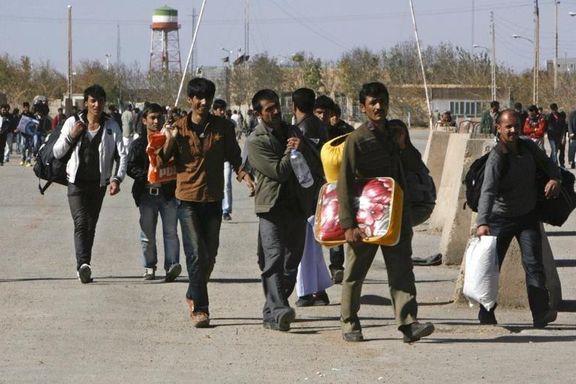
More than 40,000 Afghan refugees were deported from Iran in the last month, according to the Taliban's Ministry of Refugees.

More than 40,000 Afghan refugees were deported from Iran in the last month, according to the Taliban's Ministry of Refugees.
Acting Minister for Refugees and Repatriation Abdul Rahman Rashid, stated that approximately 46,000 people returned voluntarily, while around 43,000 others were deported from Iran due to lacking legal documents for residence.
Less than three weeks ago, a military official in Sistan and Baluchestan province reported the return of thousands of Afghan refugees in just one day, solely through one Iranian border crossing.Parviz Ghasemzadeh, the commander of the Zabul border regiment, claimed that 4,767 Afghan citizens were arrested for reasons such as illegal entry, illegal stay, or expired passports, and were transferred to Afghanistan through the Milak border crossing in the north of Sistan and Baluchestan province.
According to the latest figures communicated by the Government of Iran to the UN's refugee commission (UNHCR), 762,000 refugees live in Iran, of which 750,000 are Afghans and 12,000 are Iraqis. Around 586,000 Afghan passport holders with Iranian visas also live in Iran.
The UNHCR claims that in 2022, the government of Iran undertook a headcount of all undocumented Afghan nationals in the country, including those who newly arrived following the Taliban takeover in 2021, through which some 2.6 million Afghans were registered.
According to official figures from Iran, 500,000 undocumented Afghans did not participate in the headcount and it is estimated that since the US withdrawal in August 2021, a total of 1,000,000 Afghans have fled to the country.
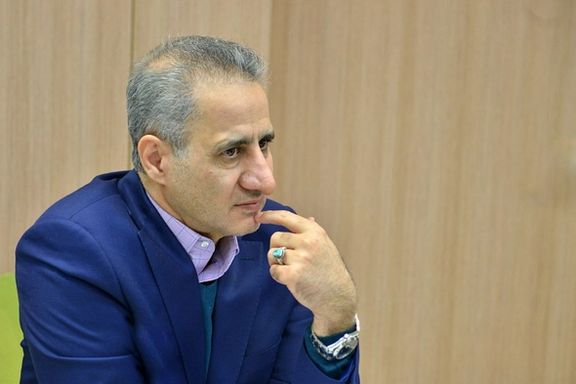
The Iranian Oil, Gas, and Petrochemical Products Exporters Union has revealed that China and Russia avoid business in Iran due to international sanctions.
In a recent interview with Iran Watcher, Hamid Hosseini said major Chinese and Russian companies, renowned for their international presence, have refrained from engaging in business with Iran due to the prevailing sanctions on the country’s oil industry.
This is despite Iran's 25-year contract with China, signed on March 27, 2021, in a ceremony at the Iranian Foreign Ministry in Tehran and a proposed 20-year economic trade deal with Russia which is still in negotiations.
Initially proposed by Iran's Supreme Leader Ali Khamenei during President Xi's 2016 visit to Tehran, the China agreement has remained a contentious issue within the country, with details largely undisclosed to the public.
Hosseini expressed that the sanctions have rendered major Chinese state-owned companies unable to collaborate with Iran, despite the contract.
While Iran has indicated its intention to strengthen trade relations with Asian countries, especially China, as talks with the United States and Europe over Tehran's nuclear program have yet to yield a resolution, China has been cautious about challenging existing US sanctions. Beijing's cultivation of closer ties with the Persian Gulf Arab countries and Israel has further complicated the situation.
Many Iranians have voiced their discontent with the cooperation agreement with China and the proposed 20-year deal with Russia, expressing concerns that the agreements may compromise the nation's interests.
However, dealings with Russia continue, not least in the field of drones and ammunition, with the two sanctioned nations finding ways to do business around global sanctions. Only in June, Russia's TASS news agency claimed that a free trade zone agreement between Iran, Russia and several countries in the vast Eurasian region spreading from the borders of Eastern Europe to Western China is possible by the end of the year.
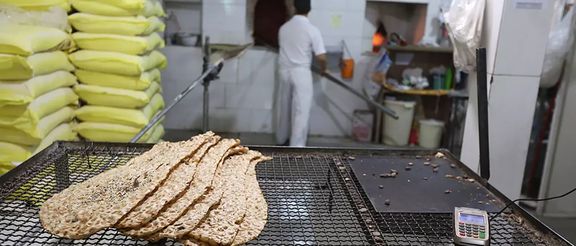
Iran's state television has confirmed an increase in 13 provinces in the price of bread, the main staple in Iranians’ diet, after weeks of contradictory statements.
In the past few weeks various government officials had repeatedly denied media reports about the government’s intention to increase the price of bread, supposedly because following subsidy reforms in May 2022, former Minister of Economy Ehsan Khandouzi had stated that an increase in the price of bread was “the President’s redline” and other officials had repeated it.
The increase in the price of bread has now officially been announced in several provinces including Khorasan-e Razavi (Razavi Khorasan), South Khorasan, Markazi (Central), Qazvin and Fars.
Coming months after large anti-government protests, the higher bread prices carry the danger of renewed unrest.
Last week Iranian media reported an increase of around 40 percent in the price of bread, without any prior announcement, in the northeastern province of Khorasan-e Razavi, followed by several other provinces.
According to Ahmadreza Keshtgar, Chairman of Bakers’ Union in Mashhad, capital of Khorasan-e Razavi, the union had proposed an increase of 110 to 115 percent but the province governor’s office did not agree to raise the prices more than 40 percent.
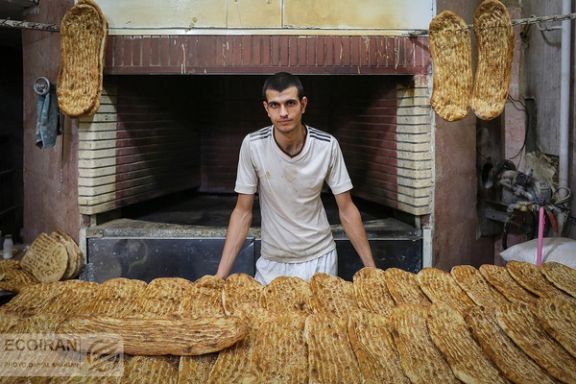
Reza Ramezani, deputy governor-general of Mashhad, told Khorasan newspaper on July 26 that the plan to increase the price of bread had been in the pipeline for a while because bakers are paying higher for labor, rents, tax, and utilities.
Bakers say despite the lower cost of subsidized flour, other production costs (labor, other ingredients including yeast and oil) have increased so much in the past year and their sales have dropped so that they are still not able to make a profit.
Earlier in June the Bakers’ Union had revealed that subsidized flour allocations to some bakeries had dropped by more than half their quota.
The traditional semi-flat bread called barbari, for instance, the unbaked loaf of which is supposed to weigh 400 grams, sold at 8,500 rials ($0.17) before the increase but has now risen to 12,000 rials. ($0.24). Although this might seem cheap by world standards, the average salary in Iran is about $200 a month and people’s purchasing power is severely curtailed after the currency rial fell to historic lows last year.
The subsidy was introduced in April 2018 by the government of President Hassan Rouhani when former US president Donald Trump signaled his intention to withdraw from the Obama-era nuclear agreement with Iran known as the Joint Comprehensive Plan of Action (JCPOA), and Iran’s national currency began to nosedive. Prices for imported goods skyrocketed and the government decided to provide cheap dollars to importers of essential goods including flour to keep prices low.
On May 1, 2022, the parliament voted to allow the government to scrape an annual $10-14 billion subsidy for essential food and medicine despite warnings of higher inflation, which already stood at around 40 percent, and hardship for the most vulnerable. This led to a ten-fold increase in the price of flour.
The government of President Ebrahim Raisi then introduced a “smart plan” to continue the bread subsidy and issued digital cards that had to be used at the time of purchase, arguing that the plan would prevent the smuggling of subsidized flour and bread to neighboring countries where they sold at much higher prices.
Bakers complain that the ration card system is causing them many problems including disruption of trade when the internet is down. They also say the government does not always reimburse them for its share of the price of bread purchased by customers (subsidy) on time.
The massive jump in the price of flour after removal of its subsidies has affected the price of a wide range of other goods including pasta, biscuits, and cakes. Meanwhile, non-traditional loaf breads are available at in other bakeries at unsubsidized prices.
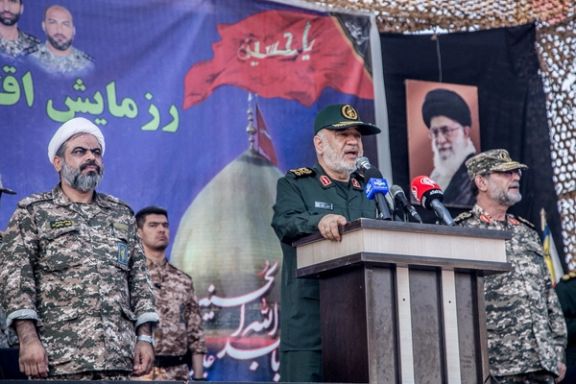
Amid continuing tensions in the Persian Gulf, the IRGC commander reiterated Tehran's demand for the United States to leave the region.
Gen. Hossein Salami claimed the countries of the region are capable of establishing the security of the Persian Gulf.
Tensions in the Persian Gulf heightened on Wednesday as the Islamic Revolutionary Guard Corps (IRGC) initiated unexpected military exercises on three Persian Gulf Islands disputed by the United Arab Emirates.
Salami speaking about security in the region stated, "The regional states are capable of establishing the security of the Persian Gulf based on Islamic brotherhood and loyalty, without the need for the presence of US or its allies."
The military exercise, conducted by the IRGC Navy, saw the participation of operational combat units, boats, missiles, drones, electronic warfare, and rapid response forces.
During the exercise, the IRGC unveiled two "advanced weapons systems" - the Qadir cruise missile and the Fath 360 ballistic missile, both claimed to be equipped with artificial intelligence capabilities. Unmanned aerial vehicles (UAVs) allegedly with AI capacity were also deployed, successfully destroying predetermined targets.
The operationalization and equipping of new IRGC boats with missiles, with a range of 600 km, was another part of the exercise.
The IRGC's military maneuvers were primarily centered around Abu Musa Island, with additional troop landings on the Greater Tunb Island, the islands disputed by the UAE.
The United States has boosted its military presence in the region following Iran's attempts to interfere with maritime traffic in the Strait of Hormuz and its surrounding waters.
In response to the US deployment, Salami issued a warning, stating, "Our nation is vigilant, and it gives harsh responses to all threats, complicated seditions, secret scenarios, and hostilities."
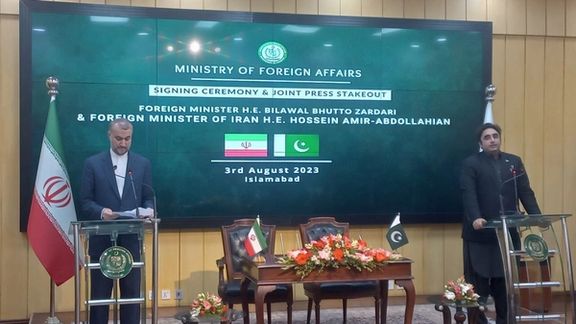
Hossein Amir-Abdollahian, Iran's Foreign Affairs Minister, has arrived in Islamabad to hold bilateral talks with Pakistani officials on regional issues.
The visit is seen as an opportune moment for both nations to focus on regional connectivity, energy cooperation, and enhancing economic and investment partnerships.
Afghanistan holds a vital place in the agenda. Experts have underscored the importance for Iran and Pakistan to establish a common viewpoint concerning the war torn nation, ensuring the preservation of Tehran and Islamabad's interests.
Since the Taliban's ascent to power in Afghanistan, the activities of the terrorist group Tehrik-e Taliban Pakistan have escalated, leading to security concerns in Pakistan. As such, resolving the Afghanistan issue remains a top priority for Islamabad.
Iran's concerns regarding Afghanistan are equally significant due to the shared border and water resources. Experts believe that reaching a unified approach on Afghanistan's issues will be instrumental in addressing the challenges that both Iran and Pakistan have faced in recent years, including hosting Afghan immigrants.
In an official statement, Iran's Ministry of Foreign Affairs revealed that Amir-Abdollahian will meet with the Prime Minister of Pakistan. He is also scheduled to address the speaker of the National Assembly and the chairman of the senate.
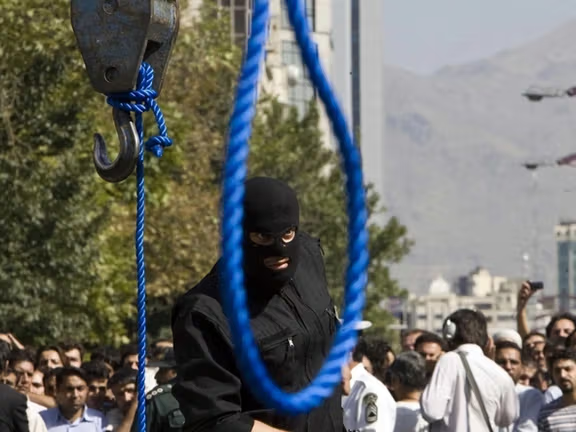
Human rights groups said Wednesday that at least 11 Baluch citizens were executed during the past three days, bringing the number of hangings to 423 in Iran in 2023.
Advocacy group Haalvsh, which reports on issues affecting the Baluch minority, said the executions were carried out in several prisons in the southwestern Sistan-Baluchestan province and the northeastern city of Birjand.
The report added that none of the prisoners – who had been sentenced to death over drug-related charges --had their final meeting with their families, “and the families have only been called to receive the bodies of their loved ones."
According to the Norway-based Iran Human Rights (IHRNGO),423 people – including 10 women -- were executed since the beginning of 2023.
In July, the US-based Human Rights Activists in Iran (HRANA) released a report saying that approximately 5,000 executions have taken place in Iran in the last 10 years.
With many cases of executions not officially reported, the actual number is undoubtedly higher.
According to a HRANA report, the number of executions increased by over 88 percent in 2022 compared with a year earlier. There was a sharp rise in reported human rights violations since mid-September when the 22-year-old Kurdish woman Mahsa (Jina) Amini died in the custody of the so-called 'morality police' following which protests swept across the country.
As the execution wave shows no signs of slowing, protests continue across the country, only fueled by the relentless crackdowns.
Amid a spike in executions since late April, on May 19, authorities arbitrarily executed three tortured protesters, Majid Kazemi, Saeed Yaghoubi and Saleh Mirhashemi who were convicted and sentenced to death in Esfahan without due process of law.
The deaths brought to at least seven the number of protesters hanged since nationwide protests broke out in September 2022 following the death in custody of 22-year-old Mahsa Amini.